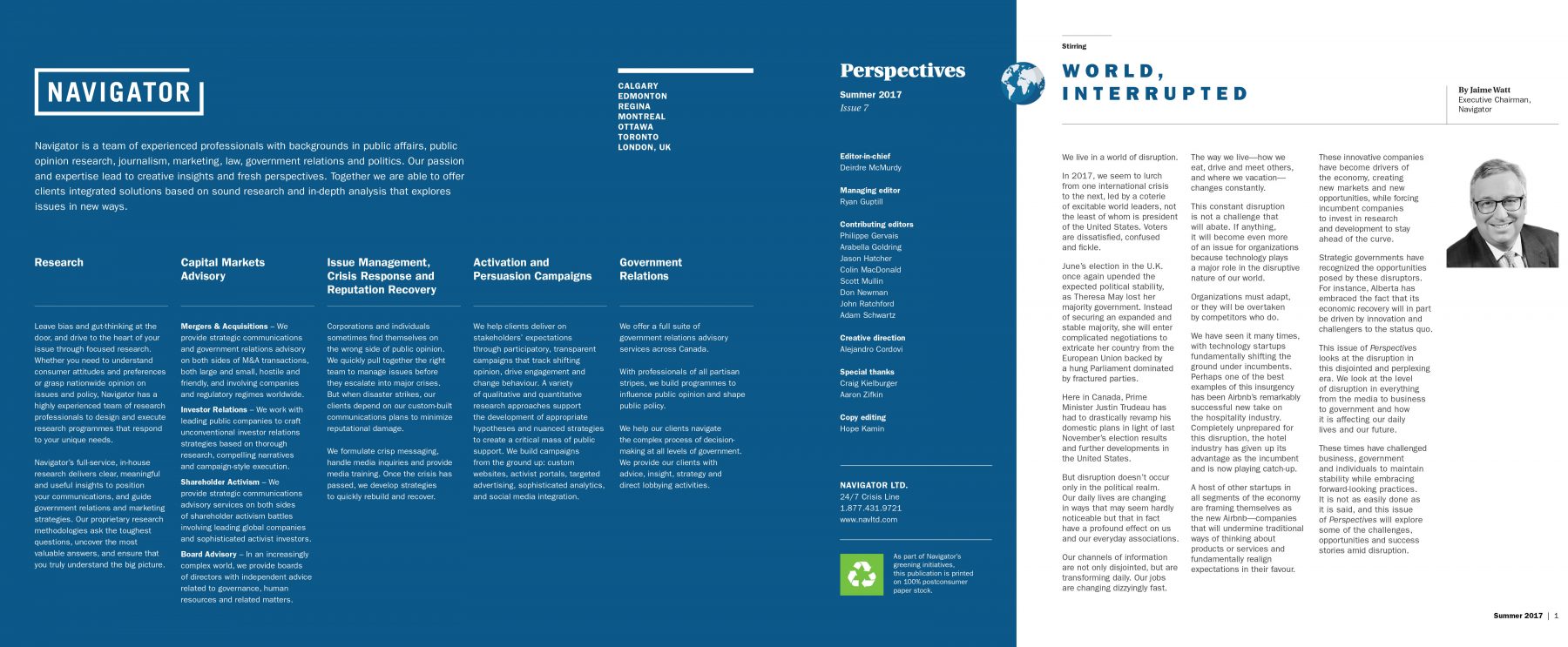- CEOCap
- Jaime Watt’s Debut Bestseller ‘What I Wish I Said’
- Media Training
- The Push Back
- Internship program
- Update Your Profile
- Homepage
- It’s time for a change
- It’s time for a change
- Kio
- Ottawa
- Art at Navigator
- Navigator Limited Ontario Accessibility Policy
- Virtual Retreat 2020 Closing Remarks
- COVID-19 Resources
- Offices
- Navigator Sight: COVID-19 Monitor
- Navigator Sight: COVID-19 Monitor – Archive
- Privacy Policy
- Research Privacy Policy
- Canadian Centre for the Purpose of the Corporation
- Chairman’s desk
- ELXN44
- Media
- Perspectives
- Podcasts
- Subscribe
- Crisis
- Reputation
- Government relations
- Public affairs campaigns
- Capital markets
- Discover
- studio
- How we win
- What we believe
- Who we are
- Careers
- Newsroom
- AI
- Empower by Navigator
- Environmental responsibility

We live in a world of disruption.
In 2017, we seem to lurch from one international crisis to the next, led by a coterie of excitable world leaders, not the least of whom is president of the United States. Voters are dissatisfied, confused and fickle. June’s election in the U.K. once again upended the expected political stability, as Theresa May lost her majority government. Instead of securing an expanded and stable majority, she will enter complicated negotiations to extricate her country from the European Union backed by a hung Parliament dominated by fractured parties.
Here in Canada, Prime Minister Justin Trudeau has had to drastically revamp his domestic plans in light of last November’s election results and further developments in the United States.
But disruption doesn’t occur only in the political realm. Our daily lives are changing in ways that may seem hardly noticeable but that in fact have a profound effect on us and our everyday associations.
Our channels of information are not only disjointed, but are transforming daily. Our jobs are changing dizzyingly fast. The way we live—how we eat, drive and meet others, and where we vacation— changes constantly.
This constant disruption is not a challenge that will abate. If anything, it will become even more of an issue for organizations because technology plays a major role in the disruptive nature of our world.
Organizations must adapt, or they will be overtaken by competitors who do.
We have seen it many times, with technology startups fundamentally shifting the ground under incumbents. Perhaps one of the best examples of this insurgency has been Airbnb’s remarkably successful new take on the hospitality industry. Completely unprepared for this disruption, the hotel industry has given up its advantage as the incumbent and is now playing catch-up.
A host of other startups in all segments of the economy are framing themselves as the new Airbnb companies that will undermine traditional ways of thinking about products or services and fundamentally realign expectations in their favour.
These innovative companies have become drivers of the economy, creating new markets and new opportunities, while forcing incumbent companies to invest in research and development to stay ahead of the curve.
Strategic governments have recognized the opportunities posed by these disruptors. For instance, Alberta has embraced the fact that its economic recovery will in part be driven by innovation and challengers to the status quo.
This issue of Perspectives looks at the disruption in this disjointed and perplexing era. We look at the level of disruption in everything from the media to business to government and how it is affecting our daily lives and our future.
These times have challenged business, government and individuals to maintain stability while embracing forward-looking practices. It is not as easily done as it is said, and this issue of Perspectives will explore some of the challenges, opportunities and success stories amid disruption.


